Suzanne Falter's Blog, page 17
October 25, 2016
How to Stop Living in the Land of ‘Should’
 One of the big illusions about life is that somewhere out there … it’s better. Someone other than me is working harder, delighting more readers, and generally looking a lot hotter.
One of the big illusions about life is that somewhere out there … it’s better. Someone other than me is working harder, delighting more readers, and generally looking a lot hotter.
And so, presumably, they are on track to be the so-called winner. Maybe they even get to take home a big stuffed bear.
A part of our brain often gets fixated on how our lives should be … as opposed to how perfectly satisfying and wonderful they are right here and right now.
My friend Jon calls this sad habit ‘shoulding on yourself’.
As in ‘I should be working 50 hours weeks building my empire,’ or ‘I should have a massive list by now’. And let’s not forget that perennial favorite, ‘I should be ten pounds thinner.’
If you’re like me, you slip into shoulding without even thinking about it. I notice I get particularly should-y when thinking about my work, no matter how much I’ve accomplished. And no matter what’s going on in my life.
For instance, in five days, I’m getting married. These are the days of wine and roses, right? Yet my mind has been squarely parked on how much work I could cram in before the guests start arriving … purely out of should-i-ness.
Have I been getting all that work done? Not really. I’m too distracted! I want to take a champagne bath, and try on my wedding ring fifteen more times. I want to call all the family and friends who are showing up for the big day.
I want to hold my love and look dreamily in her eyes. I want to lie around and think about this big, gorgeous step I’m taking, savoring every minute of these pre-wedding days.
Which I would do … except for that old taskmaster, Should, in my head. Silently, she taps her stick against her hand and regards me with dismay.
Here’s the supreme irony of it all. We don’t actually get that much done when we are being ‘shouldy’. We’re much more likely to really rock the results when we let go completely and honor what’s happening here and now.
Jon, who is a very wise soul, reminds me that even a state of inertia can be God’s will for us. After all, God’s not standing around, impatiently waiting for results.
Instead, God, or the Universe, or Spirit (or whomever you recognize that great guiding Force to be), invites us all to let go and slide into the slipstream of love. Here we flow from one task to the next, effortlessly.
Here we let go and surrender and find our way to whatever would feel right next. So instead of a ‘To Do’ list we keep a ‘Why Not?’ list.
Why not take a walk and watch the clouds for as long as you want? Maybe inspiration will descend. And maybe it won’t …
Why not call someone you love and tell them so for no good reason. Then perhaps your heart will expand just a little more greatly. Or someone else’s will.
Or why not take a chance and submit a story to that hot media outlet you’ve been craving because suddenly … it just feels right?
That’s flow, baby. I highly recommend inviting it into your life.
When we get ball-and-chained to our To Do lists, there is no room to breathe and we forget the very core of our aliveness. This is how we get so very, very tired. We can’t keep up, and the strategies we’ve invested our time, our money, and our belief in begin to crumble.
This is when the ‘shoulds’ begin in earnest. And rightly so because (gasp!) we are behind. And we know in our hearts we will never catch up.
This is how we wind up soundly parked in self-doubt. Which is exactly where I was when I spoke to my friend Jon. I needed to hear him say that that there is no ‘there’ there. There really is nothing to push towards.
There is only the here and now, one beautiful day at a time.
May you join me in embracing what is true right now, for all of its warts, bumps and obvious gaps. This, too, is God’s will … just as you are.
You have been given a sacred job of simply being, my friend. So the question remains: is that good enough for you?
Me? I say yes!
Why not you, too?
The post How to Stop Living in the Land of ‘Should’ appeared first on Suzanne Falter.
October 21, 2016
How to Finally Decide You Are Enough … Just As You Are
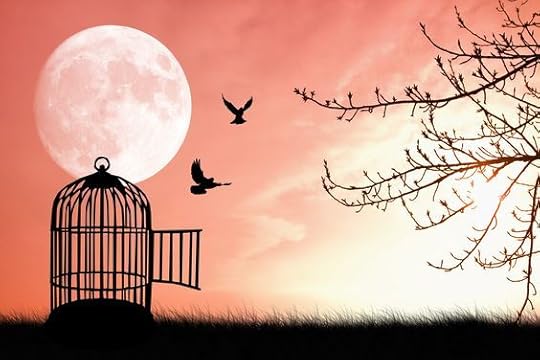 The image was frightening. Hannibal Lector’s face, complete with face mask, peered out from inside a small cage. The metal bars covering his mouth glinted in the sun.
The image was frightening. Hannibal Lector’s face, complete with face mask, peered out from inside a small cage. The metal bars covering his mouth glinted in the sun.
No, this wasn’t Silence of the Lambs 2. It was my dream, and it annoyed the hell out of me.
Because for me, the message was clear: Stop locking yourself in a cage of your own making, refusing to be heard.
The previous day I’d been in a slump, damning myself for not being more productive, more inspired, more ‘fire in the belly’.
Now in my fifth year of grief after the death of my daughter, now at the ripe old age of 57, I should be all better. Or so argues my mind.
I should be just like I was before her death — even though I am now a significantly different, older person. And even though my life has been profoundly changed.
Somehow it feels like my current level of productivity is not enough.
Enter Hannibal Lector.
When you suffer a shocking loss, you grow and evolve differently as a result. You can’t help but be changed by it, and perhaps that is the point. For what is life but a non-stop series of tumbles, splats, triumphs and recoveries?
This is how we learn.
Furthermore, we are designed to take big hits, so if we choose we can rise up again. Still we won’t ever be the way we once were. Nor should we be. We will be altered forever by our misfortune, and hopefully become wiser as a result.
For me, I am definitely humbler. I don’t need to wave flags and get all eyes in the room on me anymore. And my spirituality has grown deeper and far more connected. Part of me no longer cares about my prospects for success, either.
Yet at the same time I often feel like I just don’t quite measure up.
My mind wonders … is this softer, gentler me who lacks ambition really okay?
Is it alright, after years of grief, to not need to burn the world up anymore? My needs are met. I have everything I could possibly ask for.
So is this life I’m living actually enough, right here and right now?
Even in this driven world of striving and ambition?
At such times I always come back to an important set point. There are only two things that matter to me now. Self care, which includes the deep love I share with my partner, and my call to become a better person and share that path, step by step, with my readers.
But when I’m locked in my cage of self-doubt, I forget all of that. Then nothing I’ve done seems significant at all.
The Buddhists say I’m at choice here. I can give in to the voice of dukkha, or ‘unsatisfactoriness’, in my head and really milk it for all it’s worth. Or I can just observe it, acknowledge it and let it go.
It’s sort of like turning off the Trump-Clinton presidential debates, and deciding I don’t need all that negativity in my head.
So I am cultivating a practice of letting my feelings of weakness simply be. Because that’s all they are — just feelings and nothing more.
They are not a pronouncement about my worth in the world. They aren’t predictors of my future. And they certainly aren’t reliable signposts.
For this, too, will change. Today I might feel weak and indecisive. But tomorrow, I could get a whole new outlook on life. We are always in flux and that is an exciting thing. We never really know what could happen next.
What’s important today is to forgive myself for not being as ‘on’ as I once was. I need to give myself a compassionate pat on the back, and allow myself to do what I can comfortably do … expecting nothing more.
Then, magically, I am enough and the cage door swings slowly open. So I emerge once again, ready, willing and able to help.
Ironic, isn’t it?
But then isn’t this the sweet process of life as it unfolds, one day at a time, ever pushing us forth to become better, humbler, kinder … the embodiment of love.
The post How to Finally Decide You Are Enough … Just As You Are appeared first on Suzanne Falter.
October 10, 2016
What Donating My Daughter’s Organs Taught Me About Love
 Three and a half years ago, I sat by my daughter’s bedside, watching her slowly die as I held her hand. As machines were unplugged and the minutes ticked by, a strange new reality settled in around me.
Three and a half years ago, I sat by my daughter’s bedside, watching her slowly die as I held her hand. As machines were unplugged and the minutes ticked by, a strange new reality settled in around me.
I was losing an inextricable piece of my heart. My beautiful 22-year-old girl — who only days before was buying books for her college classes — would instead be returned to dust.
Her father, her brother and I watched, dumbfounded, as the Neuro-Trauma team went about their end of life tasks.
In an instant, life had turned radical on us. Save for one small grace.
Because of the nature of Teal’s death – a medically unexplainable cardiac arrest – her organs and tissues could be easily donated. Lives could be saved, and so my own shattered life could somehow begin to make sense again.
Today I find myself awash with gratitude.
Believe me, I’ve thought long and hard about this experience. And I’ve extracted some precious truths. For donating life is not a cut and dried experience; it lives in your heart and soul like a small, eager plant, winding its tendrils around your everyday experiences.
If you let that precious vine of love do its work, you can, in fact, be renewed. I know I was.
One of Teal’s kidneys and her liver went to two women in their fifties. Her heart and her other kidney were received by a free-spirited young woman not much older than Teal. A young woman I’ll call ‘Amy’.
“It may sounds strange,” Amy wrote to us in a letter overflowing with gratitude, “but I feel your daughter and I would have been good friends if given the chance ….”
This young woman and I have never met, though we’ve corresponded and spoken on the phone. And just those few conversations have been enough to blaze a path through my soul, as a tiny bit of light cracks open around me.
This is a really hard thing to get.
A life was saved. Like .. saved. Yes, someone’s life was actually saved.
By me. By us. By our small consortium, standing in the Neuro-Trauma unit of San Francisco General Hospital making a decision on an August afternoon. Somehow the celestial joined us that day, and waved its fairy wand.
And so a life was saved. Maybe even several.
There is someone walking around out there – a young woman, like Teal but not like Teal in her own beautiful way – who can walk up hills now without becoming faint, and who has color in her cheeks again. She can roar through the woods on zip lines, and travel around the world …
There is a young woman out there who is now free to find the career of her dreams. She can marry, have children, and pursue anything else she so desires.
There’s also a mother out there, who can rest easy at night now, knowing her daughter won’t die tomorrow. All because Teal died and we agreed to donate her organs.
So I ask you — isn’t this the point of life, to share the love, however we can? At the time, I had no idea how big this gift was – nor did I understand how it would keep giving back to me again and again.
Yet, that is exactly what happened.
You give an anonymous gift from the heart, simply because it feels like the right thing to do. And that heals your own tattered heart.
Now I understand both the fragility of life, and our own power to support and save each other. But more importantly, I understand the critical calling to save someone you may never know.
So I become uplifted every time I think of those people who have Teal’s cells, organs, and DNA in their bodies. I don’t have to know their names … I just need to know that now we are a little bit closer, these strangers and I.
We are invisible friends in the unified field of love – a magical place that unites us all. For in the end, what are we beyond bones, skin, tissues, and organs?
We are love, my friend.
In the end, we really are just love.
The post What Donating My Daughter’s Organs Taught Me About Love appeared first on Suzanne Falter.
September 29, 2016
Anger for People Who Never Get Mad
 I don’t know about you, but I hate getting mad.
I don’t know about you, but I hate getting mad.
Four years ago I lost my daughter to a sudden cardiac arrest. Along with my grief rode a sidecar of toxic, bitter anger. I found myself becoming furious at small, irrational things. Again and again I felt caught in the quick of these dark failings.
But … was my anger really a dark failing? Or was it actually alright?
Yes, it was. Turns out my anger was the sign of something stirring in the dark, narrow passageways of my grief. It was the ghost just down the way, beckoning for me to come hither.
Even Elizabeth Kubler-Ross said I was supposed to get mad.
Still, I hung back fearfully at first. I found myself twisting my anger into silent, furious knots instead. Finally I could avoid it no longer. That’s when I found out it was not only okay to get mad … it was necessary.
Just like a cool breeze on a hot day, when I finally allowed myself to feel my anger, it refreshed and restored me. It literally healed me, and became just as critical to my well-being as clean water, rest and the great outdoors. So I moved on in far greater peace once I began to own ALL of my feelings — even the less attractive ones.
If you were like me, you were raised to believe that anger is bad and that good girls don’t get mad. And certainly not at their controlling addict mothers. In my family or origin, I could never get mad at Mother under penalty of serious punishment. So I pretended ‘mad’ didn’t exist, stuck my fingers in my ears and avoided such things for the next 50 years.
This is how we grow up: numb and afraid to own or even know our anger – until it comes exploding out of us in untoward ways.
Of course, one must handle the sword of anger responsibly. But this can be learned. It simply takes practice. First you have to take some time by yourself to just breathe. And feel. Organically, your anger will rise up and then pass through you. Only then are you ready to see the truth of the matter, and possibly have a conversation about what’s bugging you.
So I’ve come to trust my anger.
Now I realize that it can be a balm to the soul. It is the release of the pressure valve, and the surrender of the false veil that has us parked in ‘Everything’s fine!’ all the time. So yes … it feels good to get mad sometimes.
When I’ve allowed it, my anger has told me again and again when things were out of balance – when I was off kilter. When danger lurked. All those years ago, when Mom was raising hell while I was trying to do my homework or possibly sleep, my anger was nothing more than warning flashers that my space was being invaded.
So I now regard my anger as a well calibrated internal warning system that tells me where to set boundaries, avoid danger and generally protect myself. In fact, it’s become a critical information source.
May you learn to enjoy your anger when it bubbles up … and honor it for the innate and powerful wisdom that it is.
As they say in the liquor ads, ‘Enjoy responsibly.’
The post Anger for People Who Never Get Mad appeared first on Suzanne Falter.
September 19, 2016
How to Deal With Bad Reviews

One of the things that happens when you publish a book is that you get reviews. Some of them are really positive. And others? Well … they’re terrible.
People misinterpret you. You misinterpret what they misinterpret. Then you lie awake at night, annoyed. Troubled. Scared.
You think … what if my book doesn’t sell?
As the great Buddhist monk Thich Nhat Hanh says, all conflict is a result of misunderstanding.
This is so true! When we hate the feedback we get, we think people have it in for us. Whether we’re artists in the public spotlight or employees showing up for a performance review, we forget something critical.
It’s nothing personal.
It’s the reviewer’s right to express an honest opinion. In fact, it’s their obligation.
After a lifetime of fleeing criticism, I finally get this. And I’m so relieved! When I was younger, I fought the specter of doing things imperfectly. I had to be brilliant at everything – or so my twenty-something brain thought.
When I published my first novel at 29, I was terrified to read my reviews. I told my editor to withhold them (yes, this was before the Internet.) I was convinced that one bad review would shut me down forever. I stuck my head in the sand and would not come out.
Twenty years later, I performed a one woman show on the Fringe Festival circuit. By now, at age 50, I figured I could take it … so I read my reviews. They loved me in Miami! They even appreciated me in Washington, D.C.
Then I got to Vancouver.
Here the reviewer tartly compared me to William Hung from American Idol, and went on to describe it as ‘painfully awkward’, ‘clued out’, ‘stale’. The list of negatives goes on and on.
As one of my fellow actors put it, ‘That review was so bad it doesn’t count.” The show flubbed in Vancouver … and so it goes.
Did it hurt? Yes.
Does it matter? No.
This experience taught me that a) my show wasn’t for everyone … and it probably needed more work and b) bad reviews won’t kill you.
Again, a review is one person’s opinion. And yes, if fifteen people say something needs work, then it probably does. That’s when reviews are truly useful.
But should we use reviews to define our worth or chart the path of our destiny?
That’s a really bad idea.
Recently I looked up the reviews for my first novel … the ones I refused to read back in 1990. Yes, some of the reviews were negative in very specific ways. And yes, their points were well taken.
But another review compared me to a ‘budding Nora Ephron’. That was a compliment I could have used back when I was young and terrified.
It was also proof that there’s no accounting for tastes.
Ultimately, there will always be people who love our work … just as there will always be people who don’t. Back when I published my first self help book, How Much Joy Can You Stand?, I literally got hate mail for writing a book about happiness.
So we all stumble through life with our corrective lenses on, trying to find our way. And we bash into each other, sometimes unapologetically.
This is life.
If we wish to express ourselves out in the maelstrom, we must expect whatever comes to come. And know, at the very same time, we are safe, we are whole and we are doing the best we can.
Then no review, good or bad, will make much of a difference at all.
(If you’d like to learn more about my books in print, please click here.)
The post How to Deal With Bad Reviews appeared first on Suzanne Falter.
September 12, 2016
What a Begonia Taught Me About Going Through Hell
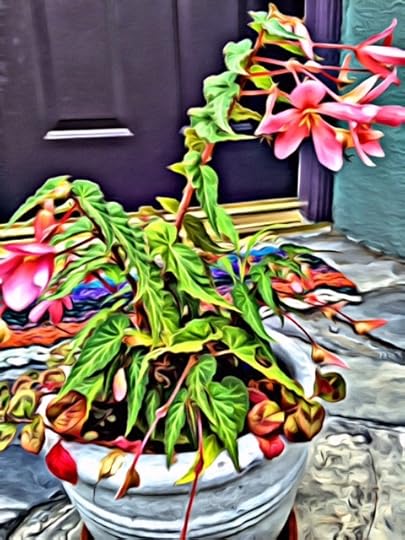 This is the story of a survivor. Namely, a Starlight begonia. Like a lot of survivor tales, it isn’t pretty. But bear with me – her story has an important life lesson for all of us.
This is the story of a survivor. Namely, a Starlight begonia. Like a lot of survivor tales, it isn’t pretty. But bear with me – her story has an important life lesson for all of us.
This begonia began her life with me when I fell in love with the woman who is now my fiancée. I chose her as the perfect house gift on our first weekend together. We found a good spot for her outside, where she thrived during the summer. Then she limped along in a sunny windowsill indoors in the winter.
Finally she died … or so it appeared. We left the begonia for dead in a forgotten corner of the kitchen, and kept meaning to yank her roots and replace her with something young and thriving.
But then one day a small miracle happened as winter was ending. One tiny, tender leaf appeared. Then two. Improbably, after an entire winter of neglect with no sun and no water, a dead plant that was no more than a dried up wisp of a stem came back to life. Right there in a dark kitchen corner, We watered her, put her outside and hoped for the best.
Here’s the most interesting part: the former plant was as light and fluffy as a twirly girl at a prom. But the new plant was far more industrial strength.
This time around she’s clearly built to last, so at first she seemed a little scary. Her main stem is nearly a quarter inch thick, as if she had been toughened by her ordeal. Like Audrey from Little Shop of Horrors.
I had my doubts about the plant, but my partner kept urging me to water her and feed her plenty of worm sludge. “Life wants to live,” she said.
Flowers began to appear – at first just a few. I frowned and shook my head. “She’s never going to be normal,” I fretted. Rachel just patted my arm. “Life wants to live,” she reminded me. So I gave her more water, more worm sludge, and hoped for the best.
The real breakthrough came, however, when we gave her one final dose of neglect. We went away for a week, during which time the starlight begonia baked under the relentless California sun without a single drop of water. I found myself worrying about her while I was gone. Would she be alright?
As if through sheer tenacity – perhaps the tenacity learned in the winter of her neglect – she not only survived, she thrived. I came home to find her putting out new flowers, new shoots, and new leaves. She became an entirely new plant in my absence.
I can relate to the begonia, because this is my story as well.
I was in twirly prom girl mode myself before the bottom dropped out. I, too, became toughened by death, destruction and test after test. What nature proves to us is that if we’re just patient, and we apply enough compost, water and loving attention, our roots can find their way back to life again. They simply, always do.
When we come back, we are stronger, more mature, and seasoned by all that we have learned. This is the way we find our way to true and lasting peace and happiness. For at this point, we are no longer infatuated with all that sparkles. Now we have become mature keepers of the heart and soul of life.
We know the secret value of ripping away all that was once familiar, and perhaps outgrown. We understand how to compost the old, and so lie fallow for a long time.
On the other side of rest and restoration lie the miracles. And so we are delivered to the next phase of our journey … if we let the magic of life unfold.
Like most things of value, this process takes time. For me, it’s been four year since my midlife meltdown began, but today my life is far better for my losses. I miss the daughter I lost but I have learned to live peacefully – even richly — without her. And I think about that young wife and mother I once was with a certain tenderness.
More importantly, my life is new and fresh again. This is what comes of burning everything to the ground. Each day I learn a little bit more about humility, and how to lay back and let life come to me, without pushing, striding or needing.
So each day I am rewarded. I wake up to another set of possibilities that nudge me forward, like a new flowers unfolding. But then, why wouldn’t my life be full of miracles … including a sson-to-be marriage at the ripe old age of 57?
It’s a fact. Life truly does want to live.
The post What a Begonia Taught Me About Going Through Hell appeared first on Suzanne Falter.
August 31, 2016
Why Is It So Difficult to Know What You Want?
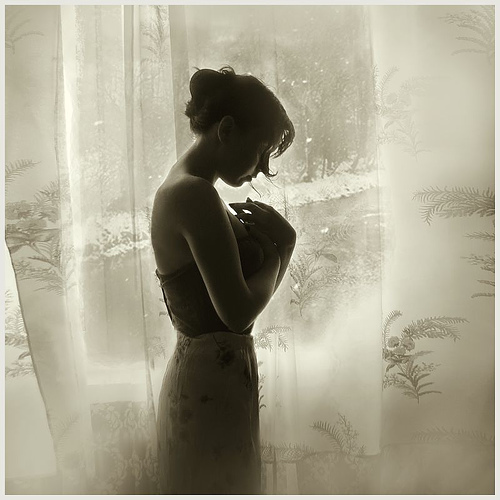 It is said that the greatest guide to living a prosperous, happy life of love is to listen to your heart.
It is said that the greatest guide to living a prosperous, happy life of love is to listen to your heart.
Just follow its guidance and you’ll be all set. At least that is the conventional wisdom that drives us to eschew the ordinary life and set off on the road less traveled.
And yet … there seems to be a design flaw.
I don’t know about you, but I have one hell of a time hearing my heart. I know its wisdom is back there somewhere. But it’s lodged behind the ranting of my incessant, worried mind, a million to-do’s, and a cacophony of mid-life emotions.
It’s also buried behind the subtle over-layer of apps, texts, emails, phone calls, appointments, traffic jams, calories, doctor appointments, instant messages, chats, whether to eat chocolate or not, and the frenetic microcosm of social media.
Bottom line: I can’t frigging hear my heart!
And yet … I know if I just stop and listen, like really stop and listen, I can hear it.
The fact is I don’t want to listen.
My heart will tell me that my constant ‘doing’ must end. That I must be willing to let go and hang out with the mystery of life for a while. If I really want to feel my feelings, I must stop being so busy-busy-busy.
My heart will say that far more urgent than anything on my ‘must do’ list is my own – our own – continued healing.
Many of us are all in a state of subtle emergency most of the time. But we proceed as if this is the human condition. And yet … it’s not.
Underneath all the furor of modern life, we are calmly rational. Furthermore, we know exactly what to do at any given moment. In fact, our nervous system is always ready to chime in with its intuitive hit to set us straight. But really … we just can’t bear to hear it.
Then change might be required. Change for which we feel ill prepared. Change that might lead us to failure.
At least that’s what the ego thinks in its protective, if misguided way.
So it is that we hang out there in vagueness … longing for something but unable to say exactly what.
So I have been quietly learning that I have no choice. If I want to be happy, I have to follow the directions of my heart whether I like it or not. Really, my heart’s the only sane driver on board.
Because when I slow down long enough to listen, life calms down. Then my faith returns and I remember I’m not alone. Instantly, I feel stronger, wiser. And somehow, I know what to do.
Bear in mind this: your heart will not ever try to set you off course. Nor will your heart ever try to hurt another. Instead, it only wants to lovingly steer you onward to become your best, every day.
That’s all that happens when you make enough time, and create enough peace, to finally listen.
What is your heart trying to tell you today that you may be avoiding?
The post Why Is It So Difficult to Know What You Want? appeared first on Suzanne Falter.
August 16, 2016
Tapping Into the Joy of Life — A Word From Teal
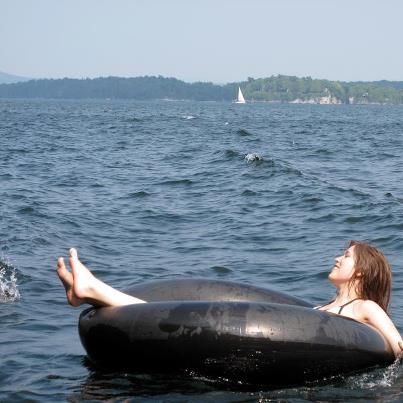
Photo: Britt Nielsen
This is the week each year when I celebrate, and grieve, the loss of my daughter, Teal. Four years ago she died from a medically unexplainable cardiac arrest … and since then she’s been anything but quiet.
So my entire perspective about both life and death have shifted radically. I no longer fear other people, or face the world with my tough-girl game face of intimidation. Instead, I’m far more interested in fun.
No longer must I know how everything will come out, or ‘work hard’ to micromanage and coerce results.Turns out I don’t have to grip and hold on to be safe.
Instead I’m learning to tap into the gorgeous flow that surrounds us, and ride the undulating waves of life with unexpected ease. And to accept what comes as necessary and important.
So I just surf – and when I fall off, and get sidetracked into some unpleasant emotional experience, I do my best to shake myself off, get back on the board and … ride! It’s a practice. And that’s the other thing — I don’t have to do it perfectly.
And so life has become fun again. Even death isn’t a particularly big deal any more.
When the worst thing that can possibly happen comes to pass, you discover an unexpected sweetness on the other side of that crisis. A transformation comes that makes your entire life far better.
If you allow it.
This morning I felt Teal around me, speaking into that small, still space between sleep and waking. It’s the very same space we heard a lecture about only a few hours before her collapse … the ethereal passageway that shamans travel in between the afterlife and our world.
And so I received a message from her that I am meant to share with you here.
Do not judge death with the same limited mind that barely learns or understands the potential in life.
You feel that potential sometimes in life’s magic – the touch of a lover’s hand, the triumph of a long-cherished dream. Or in the laughter of a child.
But you are afraid of that power and so you hang back.
Do not hang back. Instead, become quieter and quieter until you are fully suffused with the power and majesty of God who lives inside of you.
Then let go. Do what you want. Allow yourself to truly feel your own deep, soaring magnificence.
The full, God-given gift of life is available to those who do not fear death. For loss is only temporary, a fleeting stab of pain.
Namaste!
The post Tapping Into the Joy of Life — A Word From Teal appeared first on Suzanne Falter.
August 8, 2016
How I Finally Learned to Open My Heart
Some ye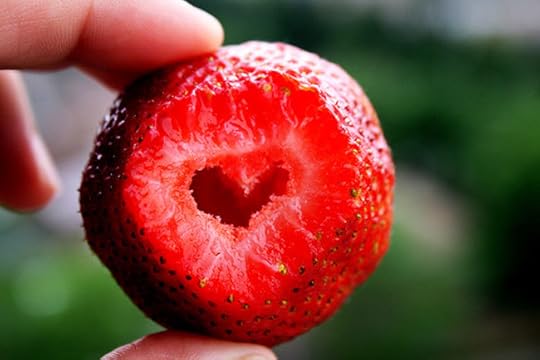 ars ago a psychic in Key West, FL told me something I’m only just now beginning to understand.
ars ago a psychic in Key West, FL told me something I’m only just now beginning to understand.
As I sat there in front of her, in a darkened room all full of incense, she intoned: “You’ll have the success you want, Suzanne… but only when you open your heart.”
I wasn’t sure what this meant, exactly, but I did what any good self-help devotee would do. I set out to crack the code on what ‘opening your heart’ meant.
My first stop was the aromatherapy store, where I spent a good hour sniffing this and that until I’d whipped up my own little brew designed to split open a congested heart chakra. (Mind you, I had no idea what I was doing, but this did seem like the place to start.)
Then I headed over to my friend, Mary, the Oriental Medicine Woman. Mary listened to me quite seriously when I requested she set lots of needles that would open my heart. After the third treatment, she gingerly asked how it was going.
“I don’t know,” I replied.
“Well, what would ‘opening your heart’ be like?” she asked.
Again, I could not answer. Meanwhile, a nightly application of my heart chakra oil was giving me nothing but a greasy, rose-scented chest. Ultimately, I forgot about opening my heart as the whirlwind of life sucked me on toward the next endeavor.
Then one night I sat up in bed, suddenly aware of exactly what opening my heart really means. At the time it meant working extremely hard on my passion, and investing time, money, and energy in getting it out there. And it meant facing down fear, and being uncomfortable, and having the courage to truly share myself with others.
I thought I knew this already from leading my first workshop. During the weeks that I created it, I was racked with doubt; I had to keep making one uncomfortable phone call after another. Yet, when that first day was over, we all seemed to be floating a few feet above the ground.
For the first time I saw how I had really moved people. The feeling was one of deep, intimate connection with others. It was profound and unforgettable.
Now, decades later, ‘opening your heart’ has come to mean something else, yet again.
In the first few years after losing my daughter, it meant having the courage not to work incessantly, but instead to become to very still and focus on feeling. To let my own grief well up inside until it found its way out into the broad daylight. And to let myself have the luxury of many a good, long cry.
Then as my grief receded and I returned to the swing of life, I found opening my heart meant tuning in to the people around me. So I learned not do to my work not for the sake of success and ambition … but for the sake of love.
In this way I have found my way back to empathy, and true forgiveness – a deep, deep place of surrender, humility and grace. Over the last few years I learned, for instance, to really forgive my mother. To finally let that poor woman, as flawed as she was, off the hook.
I have also learned to cut myself a break as well. No longer do I have to do everything perfectly. Nor must I intimidate or impress people with my toughness, and my professional valor. I don’t even need to run from every person I fear or even disagree with.
Instead, these days I can be soft and gentle. I can listen to others, and I can comfort myself. I can tune into my needs and make requests. When I do this … it turns out the world is a pretty wonderful place.
In forgiving the world, I have learned to forgive myself, as well. And so I dissolve into love.
This is the love that waits, like a pool in our heart, for us to come swim in its bliss. And it is nothing more than our own shimmering, endless sea of bounty.
You have it and I have it.
Turns out this is the gold that awaits when we open our heart.
Go within to find your own place of letting go. What or who holds you fast in resentment, anger, chaos or confusion? What is the decision you made that you cannot forgive yourself for?
What is the loss you cannot face? What is the choice that will set you free?
Perhaps not today, but soon, you will find yourself releasing the bonds that hold you fast so you, too, may swim in the sea of bliss.
The water’s fine … I encourage you to dive in!
The post How I Finally Learned to Open My Heart appeared first on Suzanne Falter.
How I FInally Learned to Open My Heart
Some ye ars ago a psychic in Key West, FL told me something I’m only just now beginning to understand.
ars ago a psychic in Key West, FL told me something I’m only just now beginning to understand.
As I sat there in front of her, in a darkened room all full of incense, she intoned: “You’ll have the success you want, Suzanne… but only when you open your heart.”
I wasn’t sure what this meant, exactly, but I did what any good self-help devotee would do. I set out to crack the code on what ‘opening your heart’ meant.
My first stop was the aromatherapy store, where I spent a good hour sniffing this and that until I’d whipped up my own little brew designed to split open a congested heart chakra. (Mind you, I had no idea what I was doing, but this did seem like the place to start.)
Then I headed over to my friend, Mary, the Oriental Medicine Woman. Mary listened to me quite seriously when I requested she set lots of needles that would open my heart. After the third treatment, she gingerly asked how it was going.
“I don’t know,” I replied.
“Well, what would ‘opening your heart’ be like?” she asked.
Again, I could not answer. Meanwhile, a nightly application of my heart chakra oil was giving me nothing but a greasy, rose-scented chest. Ultimately, I forgot about opening my heart as the whirlwind of life sucked me on toward the next endeavor.
Then one night I sat up in bed, suddenly aware of exactly what opening my heart really means. At the time it meant working extremely hard on my passion, and investing time, money, and energy in getting it out there. And it meant facing down fear, and being uncomfortable, and having the courage to truly share myself with others.
I thought I knew this already from leading my first workshop. During the weeks that I created it, I was racked with doubt; I had to keep making one uncomfortable phone call after another. Yet, when that first day was over, we all seemed to be floating a few feet above the ground.
For the first time I saw how I had really moved people. The feeling was one of deep, intimate connection with others. It was profound and unforgettable.
Now, decades later, ‘opening your heart’ has come to mean something else, yet again.
In the first few years after losing my daughter, it meant having the courage not to work incessantly, but instead to become to very still and focus on feeling. To let my own grief well up inside until it found its way out into the broad daylight. And to let myself have the luxury of many a good, long cry.
Then as my grief receded and I returned to the swing of life, I found opening my heart meant tuning in to the people around me. So I learned not do to my work not for the sake of success and ambition … but for the sake of love.
In this way I have found my way back to empathy, and true forgiveness – a deep, deep place of surrender, humility and grace. Over the last few years I learned, for instance, to really forgive my mother. To finally let that poor woman, as flawed as she was, off the hook.
I have also learned to cut myself a break as well. No longer do I have to do everything perfectly. Nor must I intimidate or impress people with my toughness, and my professional valor. I don’t even need to run from every person I fear or even disagree with.
Instead, these days I can be soft and gentle. I can listen to others, and I can comfort myself. I can tune into my needs and make requests. When I do this … it turns out the world is a pretty wonderful place.
In forgiving the world, I have learned to forgive myself, as well. And so I dissolve into love.
This is the love that waits, like a pool in our heart, for us to come swim in its bliss. And it is nothing more than our own shimmering, endless sea of bounty.
You have it and I have it.
Turns out this is the gold that awaits when we open our heart.
Go within to find your own place of letting go. What or who holds you fast in resentment, anger, chaos or confusion? What is the decision you made that you cannot forgive yourself for?
What is the loss you cannot face? What is the choice that will set you free?
Perhaps not today, but soon, you will find yourself releasing the bonds that hold you fast so you, too, may swim in the sea of bliss.
The water’s fine … I encourage you to dive in!
The post How I FInally Learned to Open My Heart appeared first on Suzanne Falter.



